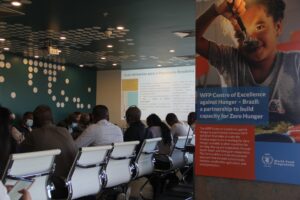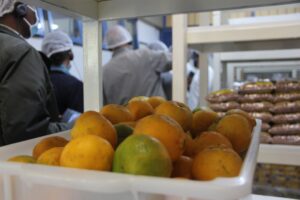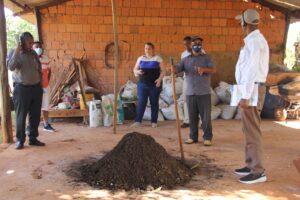A delegation of 16 representatives of the Ethiopian government ended this Friday, June 10, a week-long field visit to Brasília to get to know the Brazilian school feeding programme, especially the nutrition and rural development actions.
During the visit, the Ministers of Agriculture and Horticulture, Meles Mekonen Yimer, and of Livestock and Fisheries, Fikru Regassa Gari, specialists from various areas and partners of the NGO Save the Children, participated in technical meetings with the Brazilian entities and in field visits.
The face-to-face visit is part of a process of exchanging experiences with Brazil, organized by the Center of Excellence against Hunger of the United Nations World Food Programme (WFP), in partnership with the Brazilian Cooperation Agency (ABC) and the Fund National Education Development Program (FNDE) virtual encounters.
Ethiopia currently operates a pilot school feeding project in its capital Addis Ababa and the partnership aims to help the country transform its agricultural sector, primarily through nutrition-sensitive policies, promoting knowledge sharing and good practices.
“We could see the modalities of arrangement of public policies, with the support of laws, coordination between different systems, such as agriculture, health, education and economy.
These are systems that we know here in Brazil and that we will take back home to try to expand what currently only happens in Addis,” said Fikru Regassa Gari, Ethiopia’s Minister of Livestock and Fisheries.
Another motivator for the delegation’s visit was to find solutions to the country’s child malnutrition problem. On a visit to a public school in Brasília, the importance of a nutrition-sensitive school feeding program was evident.
Fabiana Napoli, responsible for school meals at Escola Parque 313 Sul, explained that the strategy includes diversified menus with creative and varied presentations of food, student participation in the school garden and other food and nutrition education activities. She explained that the school decided to offer breakfast instead of a snack, in addition to a hearty lunch:
“We let the child help himself with plenty because we know that, often, the only meal he will have that day will be here at school ”.
At Sítio Araúna, managed by EMATER beneficiary family farmers, Ethiopian experts spoke with farmers to learn more about the food supply chain. Photo: WFP/Ana Mascarenhas.
During the visit to the Technical Assistance and Rural Extension Company of the Federal District (EMATER), in the Planaltina region, the delegation learned about the details of the aid program for small farmers and how the law works that makes 30% of the purchase of food for school food comes from family farming. Currently, EMATER serves more than 2,000 rural properties and around 2,500 families.

The region’s main products include fruits, vegetables, flowers, poultry and livestock – mainly milk. Then, the delegation went to Sítio Araúna, managed by family farmers benefiting from EMATER and which produces organic food for local consumption and for supply to schools.
The delegation also visited Ceasa-DF (Federal District Supply Centers) and a food bank that receives and distributes food to 161 local institutions. “The Bank acts as an intermediary between the institutions and Emater to guarantee the quality and variety of food. Therefore, we understand the needs of the populations served so that the food is sent with consistency and quality”, explained Lidiane Pires, Director of Food and Nutrition Security at Ceasa.
Meles Mekonen Yimer, Ethiopia’s Minister of Agriculture, explained that the country faces problems of malnutrition among children, infants and the general population, in addition to facing problems of scarcity and access to food. “We have seen good experiences here, especially in school feeding, starting with the heads of governments, legislatures, boards and communities in the countryside, schools and government institutions. We saw this commitment to including the issue of nutrition in their work,” he said.
Tamene Taye, Director of the Sensitive Nutrition for Agriculture and Capacity Building project in Ethiopia (NSA CASE), at the NGO Save the Children, also commented that one of the main aspects observed during the visit was the way in which country policies and strategies are shared at all levels, from ministers to agricultural cooperatives.
“At all levels, you have a support structure that facilitates the execution of specific activities at all administrative levels,” she said.
Tamene Taye also highlighted the importance of family farming for nutrition-sensitive programs. “The rural extension project that Brazil has on the ground is very organized and has a direct link with the farmer, with a feedback mechanism in which farmers express the areas in which they want to be trained.
This is an excellent approach in terms of improving productivity and meeting the needs of farmers in the field,” he said. The NGO has been working with the Ethiopian government to reduce levels of malnutrition and expand the country’s school feeding program.
In addition to the external visits, the delegation also had the opportunity to talk to Brazilian experts at technical meetings.
Technical meetings
In addition to external visits, the delegation also had the opportunity to talk to Brazilian experts. On the first day, the delegation was received at the headquarters of the Ministry of Foreign Affairs for an opening session with the participation of representatives from the Ministry of Agriculture, the WFP Center of Excellence, the Brazilian Cooperation Agency, the National Fund for the Development of Education and of the Ethiopian Embassy in Brazil.
The group also met with the General Coordination of Food and Nutrition of the Ministry of Health, the National Supply Company (CONAB) and with the Secretariat of Family Agriculture of the Ministry of Agriculture.
On the last day, the technical team of the Center of Excellence facilitated strategic planning sessions to assist the country in the process of the practical application of the knowledge acquired during the visit.

“Social protection must be integrated and bring together programs in different areas, such as support for agriculture, job creation, and food assistance, among others, all working towards a common objective: to create a sustainable policy to fight hunger and create a country with no poverty.
If it was possible for a country like Brazil, I strongly believe that it is also possible for your country”, said Daniel Balaban, director of the WFP Center of Excellence, during his closing speech.

